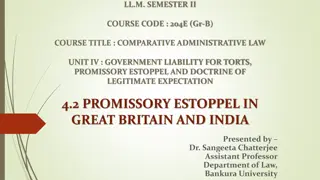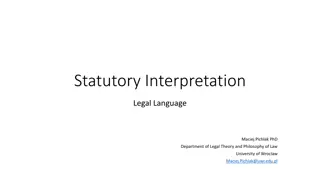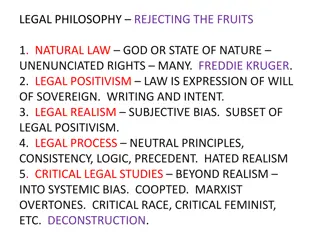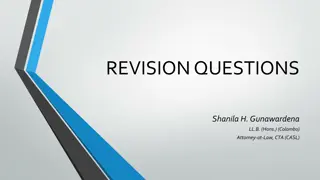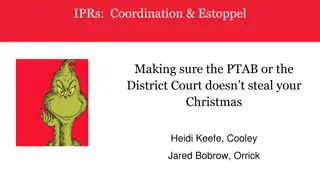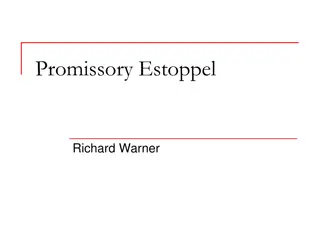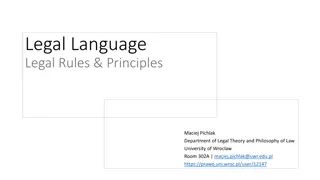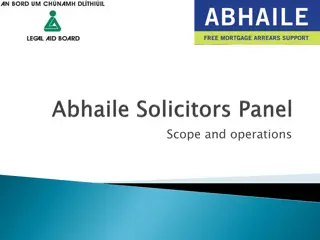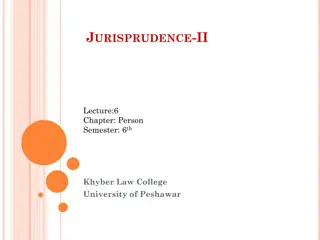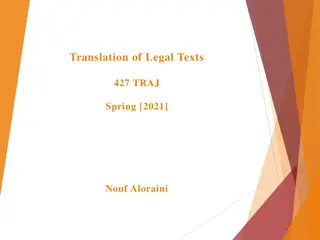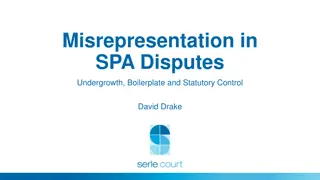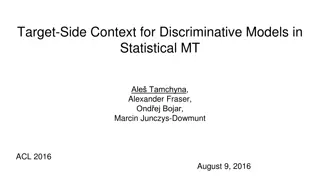Understanding Estoppel in Legal Context
Chapter VIII of the Act discusses the doctrine of Estoppel, specifically Sections 115, 116, and 117. Estoppel prevents a person from denying the truth of something they intentionally caused another to believe. It aims to prevent fraud and ensure justice by promoting good faith. Sections cover scenarios like tenant and licensee estoppel. Understanding these rules is crucial for legal clarity and fair dealings.
Download Presentation

Please find below an Image/Link to download the presentation.
The content on the website is provided AS IS for your information and personal use only. It may not be sold, licensed, or shared on other websites without obtaining consent from the author. Download presentation by click this link. If you encounter any issues during the download, it is possible that the publisher has removed the file from their server.
E N D
Presentation Transcript
Estoppel Estoppel Chapter VIII of the Act contains Estoppel. Sections 115, 116 and 117 talk about the doctrine of Estoppel. Section 115 can be broken down as follows: When one person has by his declaration, act or omission intentionally caused or permitted another person to believe a thing to be true and
to act upon such belief neither he nor his representative shall be allowed, in any suit or proceeding between himself and such person or his representative to deny the truth of that thing It is important the person who acted upon such belief did not actually know about the truth. (Read the illustration carefully.)
Object of the Rule as laid down in Maddanappa v. Chandramma AIR 1965 SC 1812- The primary idea behind the rule is to prevent fraud and secure justice between the parties by promotion of good faith and honesty. Therefore, when one person makes a misrepresentation to the other about a fact he would not be shut out by the rule of estoppel if that other person knew the state of facts and must consequently not have been misled by the misrepresentation.
Section 116 is regarding estoppel of tenant and of licensee of person in possession. This means that: The tenant of immovable property cannot during tenancy And the Licensee (through such tenant) during the license Shall not deny that the landlord had the title to the property or the person had the title to the possession No prohibition after tenancy is over.
Section 117 is regarding estoppel of acceptor of a bill of exchange or bailee of licensee. This means that: The drawer is to be protected if the acceptor denies his authority to make it or endorse it. The bailor or licensor is to be protected if the bailee or licensee denies that they had the authority to make such bailment or license.
The explanation 1 says that the fact whether the bill was really made by the one it is being said to be made can be disputed by the acceptor. Similarly explanation 2 says that if there is delivery by the bailee to a person other than the bailor, it may be proved by the former that such other person had a right to the goods as against the bailor
CaseLaw Madhuri Patel v. Addl. Commissioner, Tribal Development, AIR 1995 SC 94 CaseLaw A candidate obtaining admission to educational course by fraud cannot claim to continue on the basis of estoppel. The admission wrongly gained or appointment wrongly obtained on the basis of false social status certificate necessarily Scheduled Castes or Scheduled Tribes or OBC candidates as enjoined in the Constitution of the benefits conferred on them by the Constitution. The genuine candidates are also denied appointments to office or posts under a State for want of social status certificate. The ineligible or spurious persons who falsely gained entry resort to dilatory tactics and create hurdles in completion of the inquiries by the Scrutiny Committee. has the effect of depriving the genuine admission to educational institutions or
Sanatan Gauda v. Berhampur University, AIR 1990 SC 1075 The appellant while securing his admission in the Law College had admittedly submitted his marks-sheet along with the application for admission. The Law College had admitted him. He had pursued his studies for two years. The University had also granted him the admission card for the Pre-Law and Intermediate Law examinations. He was permitted to appear in the said examinations. He was also admitted to the Final year of the course. It is only at the stage of the declaration of his results of the Pre-Law and Inter-Law examinations that the University raised the objection to his so called ineligibility to be admitted to the Law course. The University was estopped from refusing to declare the results preventing him from pursuing his final year course. of the appellant's examination or from



